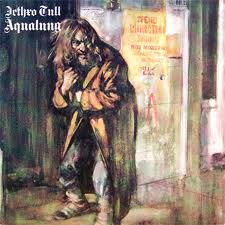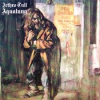Originally published by L.S. Media. November 16th 2011. 
L.S Media Rating *****
There are concept albums and there are pieces of recorded music history that deserve celebrating in absolute and outstanding style. Aqualung by Jethro Tull is one such album that can be considered amongst the very finest Progressive Rock has to offer; now that it’s been re-released for its 40th anniversary, a new generation of fans will be able to hear the reason why is considered a genuine classic of our time.
Aqualung was the fourth album by Jethro Tull but it was the one that catapulted the band to international superstardom and deservedly so as it deals with characterisation of faith and personality of God. The subjects themselves may seem to be on the outskirts of humanity fringes but the depth of warmth that vocalist and main songwriter Ian Anderson invokes in writing about them makes them feel as real and tangible as anything that had been written in song lyrics since the Beatles Progressive stage on albums such as Sgt. Pepper and The White Album.
All these snippets of humanity, the brief glimpse into the lives of the homeless, the ignorant school girls, and even the moment of clarity Ian Anderson feels after a visit to his ill father in Cheap Day Return can sum up the intensity that record buyers and fans of the band felt when they first heard this record in 1971. It’s rare for a record to encompass such generosity of spirit whilst retaining the bleak, sometimes alien landscapes it seeks to show and portray in all the characters in the songs. Even from a first glimpse at the cover with the tramp in his trade mark, dirty and perceived foul smelling overcoat can invoke a smile at the thought of this person’s story and the mixture of disgust and interest that lays within.
The opening of the title track Aqualung is gritty, its frames neatly the idea of life being cheap to those that have never been in the position of a sad, twisted, lonely man who gets whatever kicks he can by “eyeing little girls with bad intent”. Ian Anderson’s charming, sneer as he narrates the lines over some of the most fantastic guitar work heard is a joy; you want to hate the character, you want to despise the cheap and disgusting way he lives his life, the grease and disease that you can feel oozing out of every pore and every word in the lyrics but there is something of Aqualung in all of us and but for the grace of whichever deity you believe in we could be there picking up the wasted dog ends and thrown away fags just to get that little bit of warmth.
Aqualung crops up again within the dirty bass lines and seismic flute sound of Cross-Eyed Mary, it’s here perhaps where the album shows its intent of concept, although the band would deny the concept notion, by playing with one character and making the songs “hero” visible within the next track gives the idea of continuality. Perhaps Mary is the girl that Aqualung spied on many years before and still watches over her. The sense of timing and surreal is not lost.
Cheap Day Return returns the moments to the reader of Ian’s life; its poem-like structure, five lines in all takes the listener to the north of England and Preston station where Ian has thought of the nurse who looks after his father. The irony of the nurse making sure Ian was comfortable as his father is gravely ill is powerful, the age of celebrity thrust into full view as she asks Ian for his autograph is haunting and ghoulish but is delivered with panache and beauty that you can’t help for a while smile at the whimsy before the subject matter hits you full in the face. The bitterness is palpable and you end up enraged that no matter what some people will never pick their moments correctly.
The second half of the album has been noted over the years for its look at faith, God and the relationship between man-made God motifs that is stamped throughout like the beggar’s shoes traipsing in mud into the hallowed halls of a religious outpost. The music becomes an antidote to the sombre musings of the songs Hymn 43 and My God, each note soaring above the supposed dangerous and heretical leanings of the words. It’s a style that works and justifiably gives the whole album a sense of importance that fitted not only with the enlightened times that were trying to poke out from out of the late 60’s “flower power” age but also from the constraints of the 1960’s age of pop ideals.
Aqualung deserves its place in its history and the 40th anniversary re-release is a welcome addition to the canon of Jethro Tull output and a timely reminder that if the band shy away from calling Aqualung a concept album, then next year sees Ian Anderson tour on the back of the 40th Anniversary of a true concept masterpiece, Thick as a Brick. Ian D. Hall
